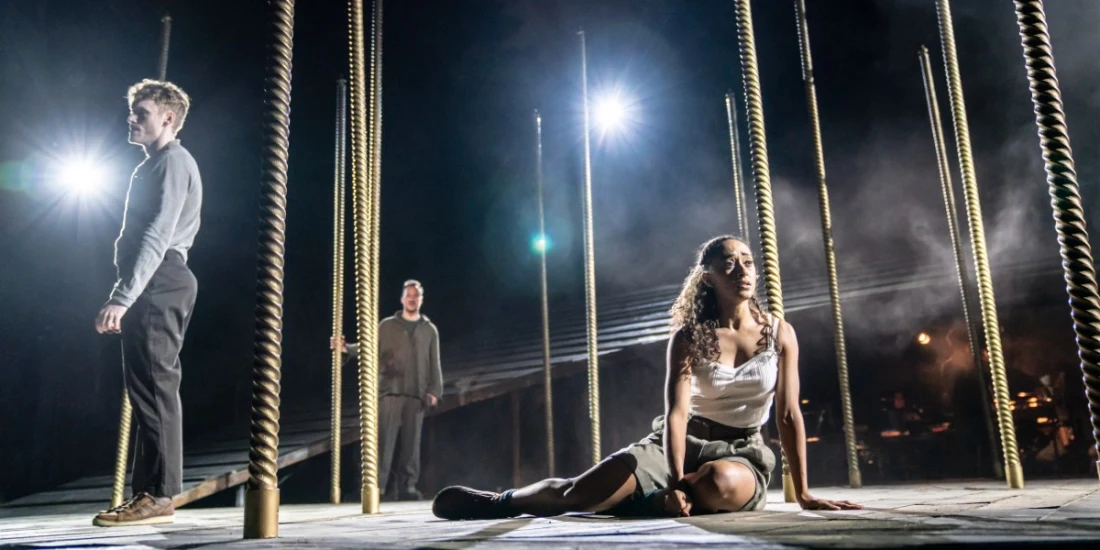A reimagined ‘Carousel’ at Regent’s Park Open Air Theatre revitalises the classic
"When you walk through a storm
Hold your head up high
And don't be afraid of the dark"
Those powerful lyrics from the Rodgers and Hammerstein classic "You'll Never Walk Alone" hit a little differently after over a year of a pandemic, a "storm" that has shuttered our theatres, separated our families, and devastated our world.
There was also a literal storm brewing on Monday night at the Regent's Park Open Air Theatre, and the company of Carousel definitely walked on through the wind, rain, and storm and delivered an emotionally complex, current, and vibrating show. If anything, the unpredictable British weather elevated the soul-stirring experience.
The storm this production centres on is the turmoil of domestic abuse, and instead of setting the show in its typical Maine seaside town, all of the performers use their local accents, bringing the story even closer to home. A programme note outlines the uptick in partner violence in England and Wales during the pandemic, highlighting the local charity Refuge that helps women, men, and children affected by domestic abuse.
I have to be honest: I've always had a hard time with Carousel because of this core plot point about a man who beats his wife and subsequently beats his daughter. There are lines in the script that seem to glorify his abusive behaviour, like when Louise likens her father's slap to a kiss, and at the end, Billy is ultimately redeemed for his actions. But updates have been made to the script to remove any celebration of these actions and Declan Bennett's rough and conflicted Billy Bigelow doesn't emerge as the traditional antihero; instead, he is truly the villain of this story.
And the women are the heroes. When Billy commits suicide on the docks, after being caught for an attempted crime, he isn't greeted by the Starkeeper, but instead by a Greek chorus of women, perhaps haunting him from his past and carrying a collection of carousel poles to create a purgatorial prison to trap him. That "prison" then becomes the stunning stage for the dream ballet, led by newcomer Natasha May-Thomas whose raw energy and static electricity creates a current that encompasses the stage for the whole of the number, which, at the performance last night, was enshrouded in rain. Billy might not be able to break free but by god, Louise can and does.
Carly Bawden's angelic Julie is a survivor, and she's able to convince us that she falls in love with Billy immediately, would stay with him, and also break out of the cycle of pain. She does wonders with "What's the Use of Wond'rin'," her voice akin to a folksy Joni Mitchell, and her final confession of love for Billy is heartbreaking.
Joanna Riding, as Julie's cousin Nettie Fowler, gives the most grounded and emotional performance I've seen in the role. When she looks on as Julie embraces a dying Billy, it's as if she's looking in a mirror, and in a sense, she is, as Riding played the role of Julie at the National in 1992 then in the West End. Now, as Nettie, she feels a sense of suffering in wanting to protect the next generation and feels she has failed Julie, and wants to make sure Julie doesn't do the same for her child.
Timothy Sheader's production is expertly conceived, and every piece fits together and is scattered with stunning stage pictures. From Molly Einchcomb's hipster-chic outfits in an array of drab hues that looked like they were pulled off ready-to-wear lines today to the ship dock-styled minimalistic set by Tom Scutt, who also collaborated on the costumes, the whole production had a magical folktale quality to it.
Drew McOnie's acrobatic choreography moves with the turntable stage, seeming to house an invisible carousel but also representing the cyclical nature of time and stubborn cycles that are not easily broken. Every movement tells a story, from a hand gesture to a balletic leap. The ensemble was made all the more impressive by the fact that it was raining for the majority of this performance.
The supporting cast is top-notch. Christina Modestou can make you laugh and cry in the same breath as Julie's best friend Carrie Pipperidge, and as Carrie's betrothed Enoch Snow, John Pfumojena gives the best-sung performance of the night. Craig Armstrong provided expert ruffian energy as Billy's no-good accomplice Jigger Craigin, and it was only after reading a programme insert, I learned he and Charlotte Riby, who excelled as the temptress carnival owner Mrs. Mullin, were both covering for company members self-isolating.
Perhaps the most radiant moment, of many incredible ones, is the ending. As the rain cleared and the company encircled the rotating stage singing, "At the end of the storm, there's a golden sky," there's a moment that's too good to give away and too good to miss. It's the sign of a new beginning, the breaking of the cycle of abuse, and the hope that maybe tomorrow will be different. That's a hope we could all use right now. Hold your head up high.
Carousel is running at Regent's Park Open Air Theatre through 25 September.
Photo credit: Jack Mitchell (Ensemble), Declan Bennett (Billy Bigelow) and Natasha May-Thomas (Louise Bigelow) in Carousel at Regent's Park Open Air Theatre (Photo by Johan Persson)
Originally published on
